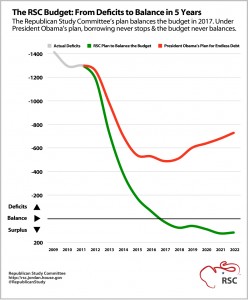NRD Editor’s Note: This post originally appeared at The Hill.

Incredibly, it is more than likely that this fundamental argument about our nation’s very future will not even make a wave in the public discourse.
It is anticipated that the House of Representatives will vote on the president’s fiscal 2013 budget proposal, which never balances the budget and which the nonpartisan Congressional Budget Office reports will leave the nation $6.4 trillion more in debt in the next 10 years. Even as Senate Majority Leader Harry Reid (D-Nev.) vows to continue his ostrich-like policy of not bringing up the president’s plan, or even attempting to pass any budget, the House will give the Obama budget the consideration it deserves.
House Budget Committee Chairman Paul Ryan (R-WIs.) will also be offering his budget, which includes some modest up-front deficit reduction and even more modest Medicare reforms. Ryan’s proposed budget will bring the federal budget to balance in 2040. Yes, if everything goes exactly as scripted in Ryan’s budget, today’s 18-year-olds can look forward to a federal balanced budget when they turn 46.
The saving grace about the Ryan proposal is that it does reduce Obama’s level of deficit spending by $3.26 trillion over the next 10 years and would flatten the income tax while eliminating many of the loopholes in the system.
Not shockingly, the White House and Democrats, led by former Speaker Nancy Pelosi (D-Calif.), are aghast at the “extreme” Ryan budget, seeing it as a breakdown of various social safety net programs that they worked so hard to expand over their four-year reign of budgetary terror from 2007 to 2011.
Now, riding into the budget balancing breach is the Republican Study Committee, led by Rep. Jim Jordan (Ohio), Rep. Scott Garrett (N.J.) and South Carolina freshman Rep. Mick Mulvaney (S.C.).
Mulvaney defeated Pelosi’s budget chairman, John Spratt, in 2010 and is a member of Ryan’s Budget Committee. The RSC budget Mulvaney champions is expected to mirror many aspects of the Ryan budget, but through tough-minded spending freezes and rollbacks would bring the budget to balance in five years.
The importance of freshman Mulvaney’s involvement cannot be overemphasized, as it reveals the real internal divisions within the Republican Conference over how aggressively deficit reduction should be tackled.
The resulting debate over the sustainability of the fiscal pathway prescribed by Obama or Ryan versus the approach preferred by deficit hawks won’t matter from a policy making perspective in this Congress, but it might set the stage for a serious approach to bringing our nation’s fiscal house in order after the 2012 election.
As our nation lurches toward the brink of a Greece-like fiscal disaster, at least the House of Representatives will be having an honest discussion on how to prevent the creditor-imposed austerity that is being felt in Europe. And in some small way, at least that is a step forward.
Rick Manning is the communications director of Americans for Limited Government. You can follow him on Twitter at @RManning957.






